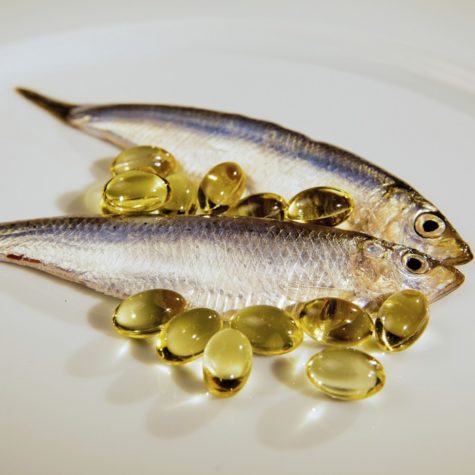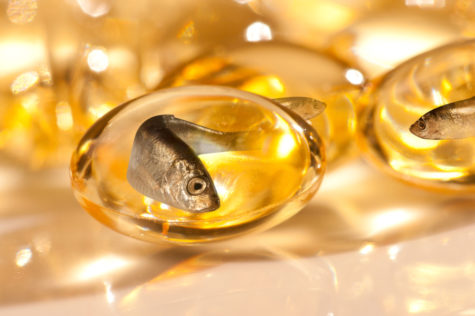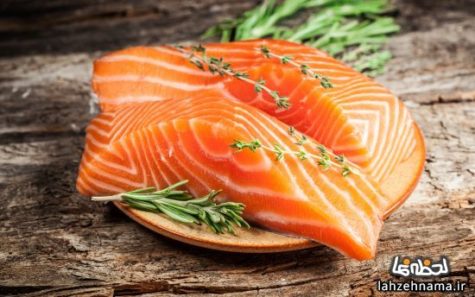Omega-3s
Where To Get The Most Omega-3s
You usually find the most omega-3 fat in the fattiest fish from the coldest deep sea. Richest sources are:
- Mackerel
- Anchovies
- Herring
- Salmon
- Sardines
- Lake trout
- Atlantic sturgeon
- Tuna
Moderate amounts are found in the following:
- Turbot
- Bluefish
- Striped bass
- Shark
- Rainbow smelt
- Swordfish
- Rainbow trout
Shellfish – crab, lobster, shrimp, mussels, oysters, clams and squid – contain lesser amounts of omega-3s.
To get the most omega-3 benefits, bake or poach fish. Frying or otherwise adding fat, especially vegetable oils high in omega-6s, decreases the omega-3 potency in the fish.
Choose tuna packed in water and sardines canned without oil, unless it is a sardine oil, noted on the label as sild Added oils, such as soybean oil, can diminish the omega-3s. Also, draining oil from the canned tuna washes away from 15 to 25 percent of the omega-3s, whereas draining water off washes away only 3 percent.
You can also get some omega-3s in certain plant foods. The highest concentrations are in walnuts, flaxseed and rapeseed (from which canola oil is made) and purslane, a green leafy vegetable that grows wild in the United States and is commonly eaten in Europe and the Middle East. However, plant omega-3s appear to be only one-fifth as potent as marine omega-3s in fostering beneficial reactions in cells.
From: Food Your Miracle Medicine
Fish Oil For Prevention
The following is a list of various disorders that fish oil may alleviate or prevent:
- Rheumatoid arthritis: Reduces joint pain, soreness, stiffness, fatigue.
- Heart attacks: Cuts the odds of subsequent heart attacks by one-third.
- Clogged arteries: Keeps arteries open and clear. Eaters of fatty fish have less atherosclerosis. Reduces risk of reclosure of arteries after angioplasty surgery by 40 to 50 percent.
- High blood pressure: Eliminates or reduces the need for pharmaceutical pressure-lowering medications.
- Ulcerative colitis (inflammatory bowel disease): In one test, eating 4.5 grams of fish oil a day – equal to that in seven ounces of mackerel – for eight months depressed disease activity by 56 percent.
- Psoriasis: Reduces itching, redness, pain in some patients, and cuts the amount of medication needed.
- Multiple sclerosis: Helps reduce symptoms in some patients.
- Asthma: Curtails attacks in some individuals.
- Migraine headaches: Lessens severity and frequency in some sufferers.
From: Food Your Miracle Medicine
The Lifesaving Power of Fish
“Our epidemic of heart disease and cancer may be the result of a human fish oil deficiency state so enormous we fail to recognize it.”
~Ewan Cameron, MD
New research underscores the enormous lifesaving power of fat in fish. Eating fatty fish can directly intervene to save people from death and disability from heart attacks. Studies have found that atherosclerosis – diseased and clogged arteries – worsens, the less marine oil a person eats.
Dr. William E. M. Lands,a pioneering researcher on fish oils, has developed a formula that he says can precisely predict an individual’s odds of heart attack; a simple finger-prick test measures a person’s blood ratio of omega-3 and omega-6 fatty acids. The higher the proportion of marine omega-3s to omega-6s, the lower the risk of heart attack. Similarly, studies reveal that a high ratio of omega-3 fatty acids to omega-6 fatty acids in the blood cuts your chances of cancer.
Although it’s largely unappreciated, our over-consumption of omega-6 oils, prevalent in margarine, salad oil, cooking oil and processed food, is helping create a health disaster. It is true, heart authorities first encouraged the widespread use of such vegetable oils to lower blood cholesterol, not suspecting the oils could have detrimental effects on other aspects of health, such as fostering inflammatory diseases, lowering immunity and promoting cancer. Such omega-6 oils are well-documented villains in augmenting cancer incidence, cancer spread and deaths in laboratory animals.
The only way to correct this abnormal and alarming fat imbalance in cells is to cut back drastically on foods rich in omega-6s and increase the intake of marine omega-3s, say experts. The impact is almost immediate. Within 72 hours, you can see a beneficial biochemical impact in tissue by eating three and a half ounces of fish a day, studies indicate.
It is smart to eat fish, especially fatty fish such as salmon, sardines, mackerel, herring and tuna, at least two or three times a week. However, adding any amount of seafood to a seafood-poor diet can readjust our fatty acid balance somewhat, helping curtail not only heart disease, but the many modern disorders linked to a “seafood fat deficiency.”
Research shows that eating just an ounce of fish a day may help restore our cells to healthy functioning, saving countless people from disability and premature death inflicted by the unimagined consequences of fat’s pharmacological powers.
From: Food Your Miracle Medicine
You Are The Fat You Eat
Very quickly after you eat fat, it shows up in the membranes of your cells where its metabolic fate is determined. Although fatty acids come in many subtle variations of molecular arrangement, two major categories are most important in making elcosanoids, (a family of powerful, hormone-like compounds produced in the body from Essential Fatty Acids).
These two major categories are omega-3 fatty acids, concentrated in marine life as well as a few land plants, and omega-6 fatty acids, concentrated in land-based vegetable oils such as corn oil, safflower and sunflower oil, as well as in animal foods raised on land-based feeds.
When you consume land-based omega-6 fatty acids from a piece of meat or corn oil, they are apt to be changed into a substance called arachidonic acid, which in turn spawns substances that are highly inflammatory or promote blood stickiness and blood vessel constriction. Fat from seafood is radically different and more benign. Its omega 3 fatty acids are apt to be converted into substances that counteract blood platelet clumping, dilate blood vessels and reduce inflammation and cell damage.
Since food is made of mixtures of omega-3s and omega-6s, obviously these two fatty acids are continuously giving contradictory instructions to cells. Which prevails – those for health or those for disease – depends on the ratio of the two fatty acids in your diet and hence your cells, says William E. M. Lands, PhD., a pioneering researcher on fish oils and formerly a professor of biochemistry at the University of Illinois at Chicago.
If your cells are flooded with omega-6 fatty acids, the resulting oversupply of overactive prostaglandins is apt to run amok, generating disease. If you have sufficient omega-3 fatty acids, they can check or cool down the archidonic engine that is spewing out the disease-producing eicosanoids.
From: Food Your Miracle Medicine






